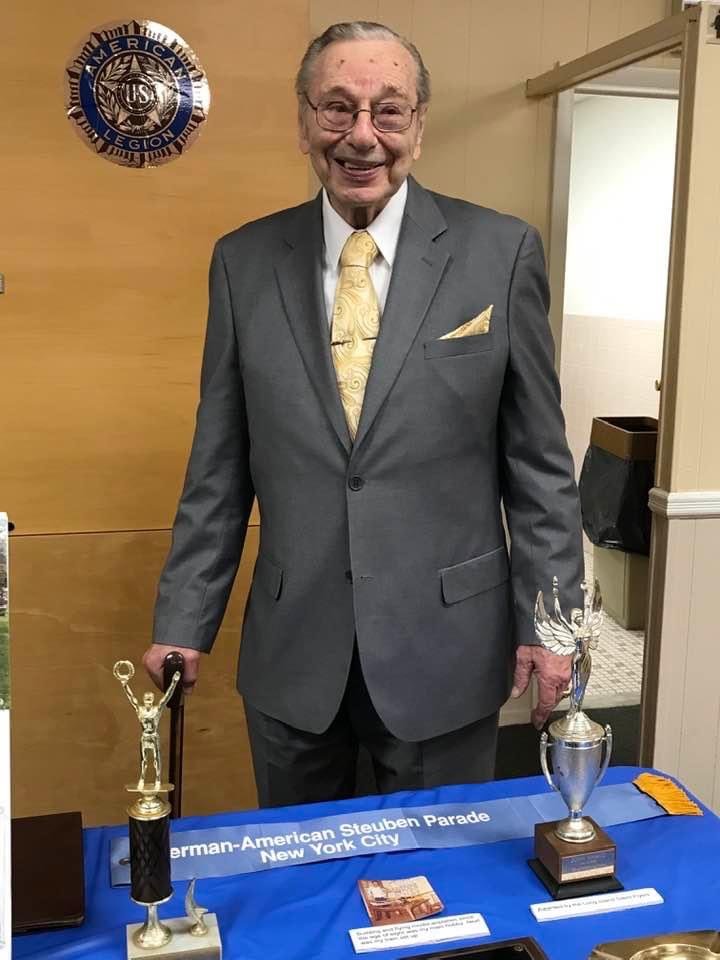This West Hempstead man's great uncle was a war hero, scoundrel, and alleged murderer
His great-great uncle was a Union Army major general widely reported to be a scoundrel, but West Hempstead’s John Shaud received a Nice Guy Trophy on his 90th birthday.
Shaud celebrated the Feb. 27 milestone with 80 family members and friends. The president of the West Hempstead Historical Society, Shaud has lived in the hamlet since he and his wife, Catherine, bought a house there in 1960, for $21,000. Catherine died 10 years ago.
Shaud served in the Air Force during the Korean War as a communications construction worker. He spent two years in Alaska installing telephone and radar locations to ward off Soviet bombers.
After his service he worked for telecommunications companies in Manhattan and on Long Island, retiring 35 years ago. The only time he had heard of West Hempstead before buying the house he still lives in was as a student at Thomas Jefferson High School in Brooklyn, when a science teacher had the class launch helium balloons with postcards asking whoever found them to mail them back. Shaud was hoping for a response from Greenland or even Europe, but a week later, his postcard arrived in the mail from a West Hempstead family.
When he was 7, Shaud’s family was visiting relatives in Philadelphia when he first learned about his infamous relative, Maj. Gen. Daniel Sickles. The family was recounting the story of Sickles gunning down his wife’s lover in broad daylight across from the White House.
Sickles had killed the son of Francis Scott Key, who wrote the poem that became the lyrics of “The Star-Spangled Banner.” Sickles was found not guilty due to temporary insanity — the first time in American legal history that defense had been used.
Shaud’s father asked the 7-year-old if he knew who Francis Scott Key was. John did not. Did he know what the national anthem was? Again, John did not. In front of the family, his father told his mother, “You’re raising a dummy for a kid.”
“That was my first impression of the gentleman Sickles,” Shaud said. “I hated him.”
Sickles remains one of the most colorful characters of the Civil War, the subject of several books. But Shaud’s fascination with history wasn’t inspired by his infamous relative. He said he was always interested in history. He has a digital photograph of the Brooklyn apartment he grew up in as the background for his computer.
He was invited to a dinner in Gettysburg, Pennsylvania, site of the Battle of Gettysburg in July 1863, by the Adams County Historical Society 25 years ago to discuss his knowledge of Sickles. The dinner took place in the Gettysburg Hotel, which was established in 1797.
During the dinner, the hotel manager overheard the name Sickles in the conversation and approached Shaud. “He said that Sickles visited the hotel on the 50th anniversary of Gettysburg and left without paying his bill,” Shaud recalled. “I said, ‘You know, I’m sure he would have paid but he died shortly after.’”
Thanks to Shaud’s deft diplomacy, the bill remains unpaid.
During his two years of military service in Alaska, Shaud learned the trade that would become his career. He was happy to leave Alaska and return to New York.
“It was an ocean of white,” he recalled. “There wasn’t a living tree. Not a living thing.”
As president of the West Hempstead Historical Society, Shaud helps place displays in the post office for holidays such as Memorial Day, to help educate people about the hamlet’s history. He was named the Herald’s Person of the Year in 2007.







